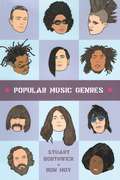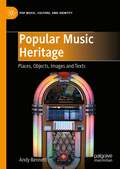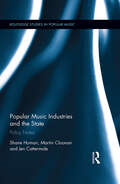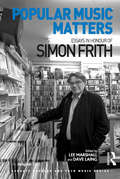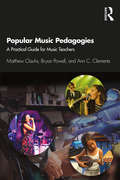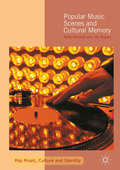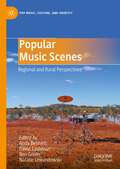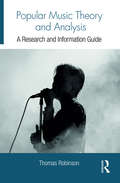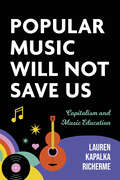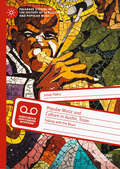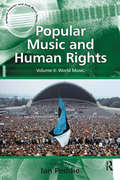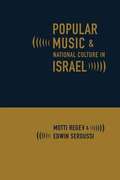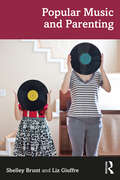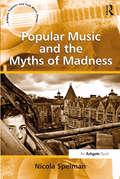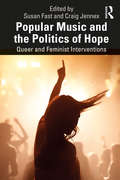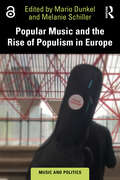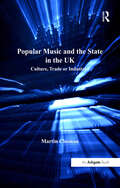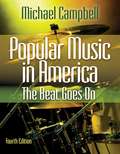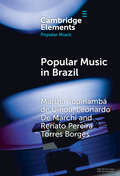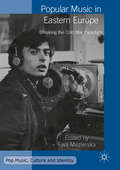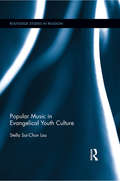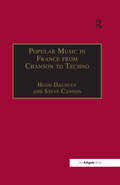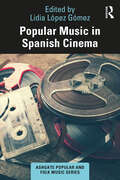- Table View
- List View
Popular Music Genres: An Introduction (Edinburgh University Press Ser.)
by Ron Moy Stuart BorthwickAn accessible introduction to the study of popular music, this book takes a schematic approach to a range of popular music genres, and examines them in terms of their antecedents, histories, visual aesthetics, and sociopolitical contexts. Within this interdisciplinary and genre-based focus, readers will gain insights into the relationships between popular music, cultural history, economics, politics, iconography, production techniques, technology, marketing, and musical structure.
Popular Music Heritage: Places, Objects, Images and Texts (Pop Music, Culture and Identity)
by Andy BennettThis book critically discusses the significance of popular music heritage as a means of remembering and re-presenting rock and pop artists, their music and their place in the culture of contemporary society. Since the mid-1990s, the contribution of popular music to the shaping of contemporary history and heritage has increasingly been acknowledged. In the same period, exhibitions of popular music related artefacts have become more commonplace in museums, and facilities dedicated to the celebration of popular music history and heritage, such as the Rock and Roll Hall of Fame, have opened their doors. Popular music heritage has found other mediums of expression too. There is now a significant popular music heritage media, including books, magazines, films and television series. Fans collect and display their own mementos, while the live performances of tribute bands and classic albums fulfill an increasing desire for the live spectacle of popular music heritage. This book will be crucial reading for established scholars as well as postgraduate and undergraduate students studying popular music heritage.
Popular Music Industries and the State: Policy Notes (Routledge Studies in Popular Music)
by Martin Cloonan Shane Homan Jennifer CattermoleThis volume studies the relationships between government and the popular music industries, comparing three Anglophone nations: Scotland, New Zealand and Australia. At a time when issues of globalization and locality are seldom out of the news, musicians, fans, governments, and industries are forced to reconsider older certainties about popular music activity and their roles in production and consumption circuits. The decline of multinational recording companies, and the accompanying rise of promotion firms such as Live Nation, exemplifies global shifts in infrastructure, profits and power. Popular music provides a focus for many of these topics—and popular music policy a lens through which to view them. The book has four central themes: the (changing) role of states and industries in popular music activity; assessment of the central challenges facing smaller nations competing within larger, global music-media markets; comparative analysis of music policies and debates between nations (and also between organizations and popular music sectors); analysis of where and why the state intervenes in popular music activity; and how (and whether) music fits within the ‘turn to culture’ in policy-making over the last twenty years. Where appropriate, brief nation-specific case studies are highlighted as a means of illuminating broader global debates.
Popular Music Matters: Essays in Honour of Simon Frith (Ashgate Popular and Folk Music Series)
by Lee Marshall Dave LaingSimon Frith has been one of the most important figures in the emergence and subsequent development of popular music studies. From his earliest academic publication, The Sociology of Rock (1978), through to his recent work on the live music industry in the UK, in his desire to ’take popular music seriously’ he has probably been cited more than any other author in the field. Uniquely, he has combined this work with a lengthy career as a music critic for leading publications on both sides of the Atlantic. The contributions to this volume of essays and memoirs seek to honour Frith’s achievements, but they are not merely ’about Frith’. Rather, they are important interventions by leading scholars in the field, including Robert Christgau, Antoine Hennion, Peter J. Martin and Philip Tagg. The focus on ’sociology and industry’ and ’aesthetics and values’ reflect major themes in Frith’s own work, which can also be found within popular music studies more generally. As such the volume will become an essential resource for those working in popular music studies, as well as in musicology, sociology and cultural and media studies.
Popular Music Pedagogies: A Practical Guide for Music Teachers
by Bryan Powell Matthew Clauhs Ann C ClementsPopular Music Pedagogies: A Practical Guide for Music Teachers provides readers with a solid foundation of playing and teaching a variety of instruments and technologies, and then examines how these elements work together in a comprehensive school music program. With individual chapters designed to stand independently, instructors can adapt this guide to a range of learning abilities and teaching situations by combining the pedagogies and methodologies presented. This textbook is an ideal resource for preservice music educators enrolled in popular music education, modern band, or secondary general methods coursework and K-12 music teachers who wish to create or expand popular music programs in their schools. The website includes play-alongs, video demonstrations, printed materials, and links to useful popular music pedagogy resources.
Popular Music Scenes and Cultural Memory
by Andy Bennett Ian RogersThis volume explores the ways in which music scenes are not merely physical spaces for the practice of collective musical life but are also inscribed with and enacted through the articulation of cultural memory and emotional geography. The book draws on empirical data collected in cites throughout Australia. In terms of understanding the relationship between music scenes and participants, much of the existing popular music literature tends to avoid one key aspect of scene: its predominant past-tense and memory-based nature. Nascent music scenes may be emergent and on-going but their articulation in the present is often based on past events, ideas and histories. There is a noticeable gap between the literature concerning popular music ethnography and the growing body of work on cultural memory and emotional geography. This book is a study of the conceptual formation and use of music scenes by participants. It is also an investigation of the structures underpinning music scenes more generally.
Popular Music Scenes: Regional and Rural Perspectives (Pop Music, Culture and Identity)
by Ben Green Andy Bennett Natalie Lewandowski David CashmanThis book examines regional and rural popular music scenes in Europe, Asia, North America and Australia. The book is divided into four parts. Part 1 will focus on the spatial aspects of regional popular music scenes and how place and locality inform the perceptions and discourses of those involved in such scenes. Part 2 focuses on the technologies and forms of distribution whereby regional and rural popular music scenes exist and, in many cases co-exist in forms of trans-local connection with other scenes. Part 3 considers the importance of collective memory in the way that regional and rural popular music scenes are constructed in both the past and the present. Part 4 examines themes of industry and policy, in relation to culture and music, as these impact on the nature and identity of rural and regional popular music scenes.
Popular Music Theory and Analysis: A Research and Information Guide (Routledge Music Bibliographies)
by Thomas RobinsonPopular Music Theory and Analysis: A Research and Information Guide uncovers the wealth of scholarly works dealing with the theory and analysis of popular music. This annotated bibliography is an exhaustive catalog of music-theoretical and musicological works that is searchable by subject, genre, and song title. It will support emerging scholarship and inquiry for future research on popular music.
Popular Music Will Not Save Us: Capitalism and Music Education (Counterpoints: Music and Education)
by Lauren K. RichermeIn today's globalized landscapes, both traditional and progressive K–12 music education practices, including those associated with popular music, can further capitalism-related inequities. In this context, music educators and students might consider how they position themselves and their music-making practices in relation to capitalist aims and processes and confront the more unethical aspects of capitalism.Popular Music Will Not Save Us challenges music educators to rethink their philosophical stances in the face of contemporary capitalist values and explores the intersection of music education and globalized capitalism, unveiling how certain practices exacerbate material inequities and erode social responsibility. As author Lauren Kapalka Richerme unravels the complexities of music education, her analysis sheds light on how prevalent practices can inadvertently uphold capitalist ideals and reinforce individualism, unceasing accumulation, and precarity in the workforce. Given that no musical genre inherently challenges problematic aspects of capitalism, Richerme proposes that music educators instead focus on affective flows, or the circulation of sensations within pedagogical spaces, and consider four alternative positionalities: thriving within, surviving under, resisting, and challenging capitalism.Popular Music Will Not Save Us advocates for a shift away from capitalistic individualism and inequities and toward a more equitable, affective pedagogical mode. Now is the time to transcend traditional boundaries and embrace a new paradigm that prioritizes social impact over commercial gain.
Popular Music and Culture in Austin, Texas: Talking with the Blues (Palgrave Studies in the History of Subcultures and Popular Music)
by Josep PedroThis book explores the blues tradition through a collective dialogue with significant musicians and producers of the Austin blues scene. Based on an ethnography in the singular capital of Texas, the self-proclaimed live music capital of the world, it explores the local blues scene through in-depth interviews that reveal intimate bonds between popular music, culture, identity, race, politics, the city and the music industry. Through the voices and experiences of 15 protagonists, readers are introduced to multiple aspects of blues lives, including music-making, style, identity, and the changing landscape of the Austin scene. While this oral history informs about particular biographies, it also delves into larger processes around popular music, culture and race, such as Jim Crow segregation, the Civil Rights era, international touring and gentrification. The book's subtitle assumes an important metaphor in regards to blues artists and the blues: that talking with blues artists is like talking with the blues; that meeting them is a way of meeting the blues. The implication is that blues artists not only form part of the tradition but they also embody the blues tradition with their lives and works, with their music, style, bodies, language, stories, and fashion. Thus, in this scene and book, the interviewees are the blues. Representatives of a contemporary music scene, these musicians and producers generally reveal an eclectic understanding of blues music, with connections to gospel, jazz, rhythm & blues, rock, soul-funk, and hip-hop. The conversations took place between 2010 and 2023, mostly face-to-face in Austin but also online and face-to-face in Madrid (Spain), where some of the musicians have performed. All of the protagonists were followed and observed closely within the everyday reality of the Austin music scene, yet the book also shows how the scene connects with many other places, including Mississippi, Houston, Memphis, New York or Madrid, through the biographies, tours and migrations of the protagonists.
Popular Music and Human Rights: World Music
by Ian PeddiePopular music has long understood that human rights, if attainable at all, involve a struggle without end. The right to imagine an individual will, the right to some form of self-determination and the right to self-legislation have long been at the forefront of popular music's approach to human rights. At a time of such uncertainty and confusion, with human rights currently being violated all over the world, a new and sustained examination of cultural responses to such issues is warranted. In this respect music, which is always produced in a social context, is an extremely useful medium; in its immediacy music has a potency of expression whose reach is long and wide. Contributors to this significant volume cover artists and topics such as Billy Bragg, punk, Fun-da-Mental, Willie King and the Liberators, Hedwig and the Angry Inch, the Anti-Death Penalty movement, benefit concerts, benefit albums, Gil Scott-Heron, Bruce Springsteen, Wounded Knee and Native American political resistance, Tori Amos, Joni Mitchell, as well as human rights in relation to feminism. A second volume covers World Music.
Popular Music and National Culture in Israel
by Motti Regev Edwin SeroussiA scholarly book on popular music's role in the national identity and political culture in Israel.
Popular Music and Parenting
by Liz Giuffre Shelley BruntPopular Music and Parenting explores the culture of popular music as a shared experience between parents, carers and young children. Offering a critical overview of this topic from a popular music studies perspective, this book expands our assumptions about how young audiences and caregivers engage with music together. Using both case studies and wider analysis, the authors examine music listening and participation between children and parents in both domestic and public settings, ranging across children's music media, digital streaming, live concerts, formal and informal popular music education, music merchandising and song lyrics. Placing young children’s musical engagement in the context of the music industry, changing media technologies, and popular culture, Popular Music and Parenting paints a richly interdisciplinary picture of the intersection of popular music with the parent–child relationship.
Popular Music and Parenting
by Liz Giuffre Shelley BruntPopular Music and Parenting explores the culture of popular music as a shared experience between parents, carers and young children. Offering a critical overview of this topic from a popular music studies perspective, this book expands our assumptions about how young audiences and caregivers engage with music together. Using both case studies and wider analysis, the authors examine music listening and participation between children and parents in both domestic and public settings, ranging across children's music media, digital streaming, live concerts, formal and informal popular music education, music merchandising and song lyrics.Placing young children’s musical engagement in the context of the music industry, changing media technologies, and popular culture, Popular Music and Parenting paints a richly interdisciplinary picture of the intersection of popular music with the parent–child relationship.
Popular Music and the Myths of Madness (Ashgate Popular and Folk Music Series)
by Nicola SpelmanStudies of opera, film, television, and literature have demonstrated how constructions of madness may be referenced in order to stigmatise but also liberate protagonists in ways that reinforce or challenge contemporaneous notions of normality. But to date very little research has been conducted on how madness is represented in popular music. In an effort to redress this imbalance, Nicola Spelman identifies links between the anti-psychiatry movement and representations of madness in popular music of the 1960s and 1970s, analysing the various ways in which ideas critical of institutional psychiatry are embodied both verbally and musically in specific songs by David Bowie, Lou Reed, Pink Floyd, Alice Cooper, The Beatles, and Elton John. She concentrates on meanings that may be made at the point of reception as a consequence of ideas about madness that were circulating at the time. These ideas are then linked to contemporary conventions of musical expression in order to illustrate certain interpretative possibilities. Supporting evidence comes from popular musicological analysis - incorporating discourse analysis and social semiotics - and investigation of socio-historical context. The uniqueness of the period in question is demonstrated by means of a more generalised overview of songs drawn from a variety of styles and eras that engage with the topic of madness in diverse and often conflicting ways. The conclusions drawn reveal the extent to which anti-psychiatric ideas filtered through into popular culture, offering insights into popular music's ability to question general suppositions about madness alongside its potential to bring issues of men's madness into the public arena as an often neglected topic for discussion.
Popular Music and the Politics of Hope: Queer and Feminist Interventions
by Susan Fast Craig JennexIn today’s culture, popular music is a vital site where ideas about gender and sexuality are imagined and disseminated. Popular Music and the Politics of Hope: Queer and Feminist Interventions explores what that means with a wide-ranging collection of chapters that consider the many ways in which contemporary pop music performances of gender and sexuality are politically engaged and even radical. With analyses rooted in feminist and queer thought, contributors explore music from different genres and locations, including Beyoncé’s Lemonade, A Tribe Called Red’s We Are the Halluci Nation, and celebrations of Vera Lynn’s 100th Birthday. At a bleak moment in global politics, this collection focuses on the concept of critical hope: the chapters consider making and consuming popular music as activities that encourage individuals to imagine and work toward a better, more just world. Addressing race, class, aging, disability, and colonialism along with gender and sexuality, the authors articulate the diverse ways popular music can contribute to the collective political projects of queerness and feminism. With voices from senior and emerging scholars, this volume offers a snapshot of today’s queer and feminist scholarship on popular music that is an essential read for students and scholars of music and cultural studies.
Popular Music and the Rise of Populism in Europe (Music and Politics)
by Melanie Schiller Mario DunkelThis book focuses on the role of popular music in the rise of populism in Europe, centring on the music-related processes of sociocultural normalisation and the increasing prevalence of populist discourses in contemporary society. In its innovative combination of approaches drawing from (ethno)musicology, sociology, and political science, as well as media and cultural studies, this book develops a culture-oriented approach to populism. Based on shared research questions, an original theoretical framework and a combination of innovative methodologies that pay attention to the specific socio-historical contexts, taking into account musical material as well as processes of reception, the five chapters in this volume offer detailed analyses of the nexus of popular music and populism in Hungary, Italy, Austria, Sweden and Germany. All of these countries have seen a marked increase in populist parties and discourses over the last years, as well as significant interactions between populism and popular music. This book will be essential reading for those investigating popular music as a crucial aspect in the study of populism as a cultural phenomenon in Europe.The Open Access version of this book, available at http://www.taylorfrancis.com, has been made available under a Creative Commons [Attribution-Non Commercial-No Derivatives (CC-BY-NC-ND)] 4.0 license.
Popular Music and the State in the UK: Culture, Trade or Industry? (Ashgate Popular and Folk Music Series)
by Martin CloonanIn an era of the rise of the free market and economic globalization, Martin Cloonan examines why politicians and policymakers in the UK have sought to intervene in popular music - a field that has often been held up as the epitome of the free market form. Cloonan traces the development of government attitudes and policies towards popular music from the 1950s to the present, discovering the prominence of two overlapping concerns: public order and the political economy of music. Since the music industry began to lobby politicians, particularly on the issue of copyright in relation to the internet, an inherent tension has become apparent with economic rationale on one side, and Romantic notions of 'the artist' on the other. Cloonan examines the development of policy under New Labour; numerous reports which have charted the economics of the industry; the New Deal for Musicians scheme and the impact of devolution on music policy in Scotland. He makes the case for the inherently political nature of popular music and asserts that the development of popular music policies can only be understood in the context of an increasingly close working relationship between government and the cultural industries. In addition he argues that a rather myopic view of the music industries has meant that policy initiatives have lacked cohesion and have generally served the interests of multinational corporations rather than struggling musicians.
Popular Music in America: The Beat Goes On
by Michael CampbellMichael Campbell's POPULAR MUSIC IN AMERICA, 5th Edition, follows the evolution of popular music from the mid-19th century to the present with discussions of connections, contrasts, and patterns of influence among artists, styles, and eras. <p><p>A new, in-depth section on 21st century music connects you to the content through a modern lens. Units are clearly defined by style and timeframe, and chapters feature narrowly focused objectives to keep you on task. This edition also features a vibrant, richly illustrated, magazine-like design, plus numerous online resources. <p><p>Almost all listening examples are available on Spotify with dedicated unit playlists and/or in YouTube examples which can be found throughout the MindTap version of the text.
Popular Music in America: The Beat Goes On Fourth Edition
by Michael CampbellThe text provides a rich account of the evolution of popular music from the mid-19th century to the present. Discussions highlight connections, contrasts, and patterns of influence among artists, styles, and eras.
Popular Music in Brazil: Identity, Genres and Industry (Elements in Popular Music)
by Martha Tupinambá de Ulhôa Leonardo De Marchi Renato Pereira Torres BorgesThis Element outlines an overview of popular music made in Brazil, from the nineteenth century to the beginning of the twenty-first century. Initially addressing the definition of the 'popular' category, discussion then follows on the ways a Brazilian music identity was built after the country's independence in 1822 until the end of the 1920s. An idea of 'popular music' was consolidated throughout the twentieth century, from being associated with rural musical performances of oral tradition to the recorded urban musical genres that were established through radio and television. After exploring the world of mass popular music, the relationships between traditional and modern, the topics of cultural diversity, multiculturalism, and the impact of digitalization, as well as the musical kaleidoscope of the twenty-first century, the Element ends with an insight into music genres in the era of digital platforms.
Popular Music in Eastern Europe
by Ewa MazierskaThis book explores popular music in Eastern Europe during the period of state socialism, in countries such as Poland, Hungary, Yugoslavia, Romania, Czechoslovakia, the GDR, Estonia and Albania. It discusses the policy concerning music, the greatest Eastern European stars, such as Karel Gott, Czesław Niemen and Omega, as well as DJs and the music press. By conducting original research, including interviews and examining archival material, the authors take issue with certain assumptions prevailing in the existing studies on popular music in Eastern Europe, namely that it was largely based on imitation of western music and that this music had a distinctly anti-communist flavour. Instead, they argue that self-colonisation was accompanied with creating an original idiom, and that the state not only fought the artists, but also supported them. The collection also draws attention to the foreign successes of Eastern European stars, both within the socialist bloc and outside of it. v>
Popular Music in Evangelical Youth Culture (Routledge Studies in Religion #20)
by Stella Sai-Chun LauChristian churches and groups within Anglo-American contexts have increasingly used popular music as a way to connect with young people. This book investigates the relationships between evangelical Christianity and popular music, focusing particularly on electronic dance music in the last twenty years. Author Stella Lau illustrates how electronic dance music is legitimized in evangelical activities by Christians’ discourses, and how the discourses challenge the divide between the ‘secular’ and the ‘sacred’ in the Western culture. Unlike other existing books on the relationships between music cultures and religion, which predominantly discuss the cultural implications of such phenomenon, Popular Music in Evangelical Youth Culture examines the notion of ‘spirituality’ in contemporary popular electronic dance music. Lau’s emphasis on the sonic qualities of electronic dance music opens the door for future research about the relationships between aural properties of electronic dance music and religious discourses. With three case studies conducted in the cultural hubs of electronic dance music – Bristol, Ibiza and New York – the monograph can also be used as a guidebook for ethnographic research in popular music.
Popular Music in France from Chanson to Techno: Culture, Identity and Society (Ashgate Popular And Folk Music Ser.)
by Hugh DaunceyIn France during the 1960s and 1970s, popular music became a key component of socio-cultural modernisation as the music/record industry became increasingly important in both economic and cultural terms in response to demographic changes and the rise of the modern media. As France began questioning traditional ways of understanding politics and culture before and after May 1968, music as popular culture became an integral part of burgeoning media activity. Press, radio and television developed free from de Gaulle's state domination of information, and political activism shifted its concerns to the use of regional languages and regional cultures, including the safeguard of traditional popular music against the centralising tendencies of the Republican state. The cultural and political significance of French music was again revealed in the 1990s, as French-language music became a highly visible example of France's quest to maintain her cultural 'exceptionalism' in the face of the perceived globalising hegemony of English and US business and cultural imperialism. Laws were passed instituting minimum quotas of French-language music. The 1980s and 1990s witnessed developing issues raised by new technologies, as compact discs, the minitel telematics system, the internet and other innovations in radio and television broadcasting posed new challenges to musicians and the music industry. These trends and developments are the subject of this volume of essays by leading scholars across a range of disciplines including French studies, musicology, cultural and media studies and film studies. It constitutes the first attempt to provide a complete and up-to-date overview of the place of popular music in modern France and the reception of French popular music abroad.
Popular Music in Spanish Cinema (Ashgate Popular and Folk Music Series)
by Lidia López GómezPopular Music in Spanish Cinema analyses the aesthetics and stylistic development of soundtracks from national productions, considering how political instability and cultural diversity in Spain determined the ways of making art and managing culture. As a pioneering study in this field, the chronologically structured approach of this book provides readers with a complete overview of Spanish music and connects it to the complex historical events that conditioned Spanish culture throughout the 20th century to the present day, from the Second Republic, the Spanish Civil war, and the dictatorship through to democracy. The book enables an understanding of the relationships between the recording and film production industries, the construction of collective imagination, the formulation of new stereotypes, semiotic meanings within film music and the musical exchanges between national and international cinema. This volume is an essential read for students and academics in the field of musicology, ethnomusicology and history as well as those interested in the study of diverse musical styles such as copla, zarzuela, flamenco, jazz, foxtrot, pop and rock and how they have been used in Spanish films throughout history.
